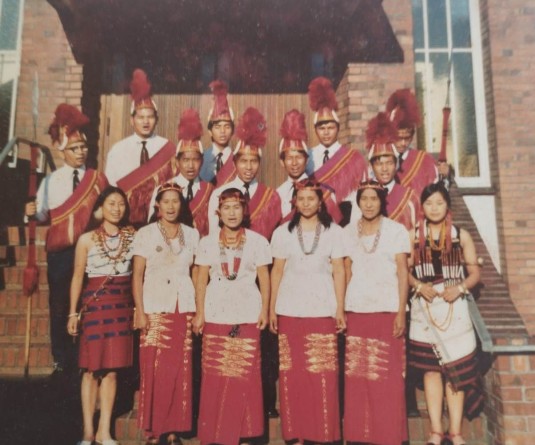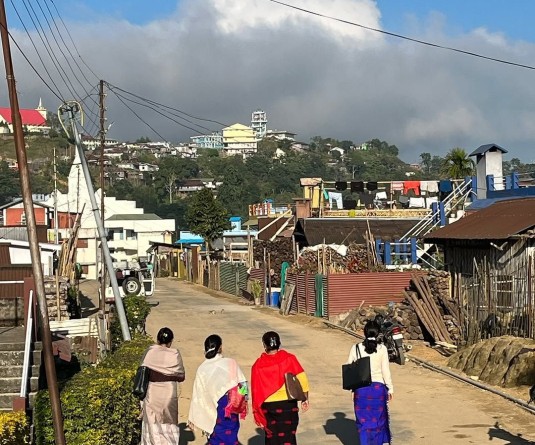
Many people, including many Nagas think that culture has to do with the way we wear our ethnic dresses, dance in our ethnic attires and yodel or sing in our traditional tunes. In a sense, these outward appearances and expressions are also part of a people’s culture. However, the true essence of a culture is something much deeper than these outward trappings. In the true meaning of culture, “a cultured people” are known or judged by the way they live and act in society rather than the way they dress and dance! It also must be understood that behind “the living” and “the acting” of a particular people lies the true essence of the people’s culture. This true essence of a culture has to do with what a people believe is right and proper. The true essence of culture is therefore based on the moral and ethical principles of a people’s beliefs. To put it in other words, culture is the physical expression of a people’s spiritual convictions.
In line with this truth, if the beliefs of a people are based on corrupt principles of racial superiority or caste supremacy, the resulting culture will be a culture where there will be high castes and low castes or high class and low class. Many nations on earth, both in the East as well as in the West, have such cultures where inhuman discrimination is meted out to the low caste and the lower class by those who consider themselves superior to others.
But unlike these other cultures, Naga culture is based on the solid foundation of the equality of every Naga individual. Building on this firm foundation, every family in every clan has equal status and every clan in every village also has equal status. Every village is in turn, a sovereign democratic republic, and every tribe is also equal to every other tribe.
On top of this, the cultural ethos and norms that binds the different Naga tribes into a nation is a unique phenomena unsurpassed in human history and civilization. In this Naga culture, great value is placed on honor, self respect and honesty. Their culture is also guided by strict taboos, strict systems of justice and a deep sense of shame over wrongs committed. This sense of shame borne by the guilty party stretches right from the individual to the family to the clan and even to the village level. At all these levels , if an individual or a group breaks or transgresses these cultural and social norms, they are condemned and held in great disdain by the whole village community. For example in the area of taboos, it is strictly forbidden to attack even an enemy village, if that particular village is stricken with some epidemic illness and are in no position to defend themselves. In the area of justice, seventh fold repayment is imposed on a thief for any item stolen by him. If the individual cannot repay it through his own means, it becomes the obligation of the thief’s clansman to collectively repay it. Such transgressions of cultural taboos and justice system are borne with a great sense of shame by the guilty party towards the whole village community.
In this unique cultural system of us Nagas, there was an unwritten but strictly observed moral and social code of conduct. This code of conduct was strictly adhered to in all facets of our social lives whether in age group works (Thetshii peli in Angami) or community works or even business transactions. In business transactions, it is considered shameful and insulting to a customer if someone sells his goods at a price that is higher than the value of his commodity. In former Naga society, the transgression of any of these cultural norms is never tolerated. But sadly, today, though we are talking a lot about our unique culture, we are not practicing it in most areas of our social lives.
Various examples can be cited in this connection, but in this present article, I want to end by focusing our cultural lenses on the present rate of essential commodities right from vegetables to building materials. To put my frustration and anger into one sentence: PRESENTLY, EVERYTHING IS BEING SOLD AT SHAMLESS EXORBITANT RATES IN OUR MARKETS. Take for example-vegetables. Whether it is wild or domestic, every vegetable rate starts from Rs. 20 to as high as Rs 80 per Kg. As for timber, B class category sells for Rs 500 per cft and A class for Rs 700 per cft. On top of this, building machines which can be bought at Guwahati for Rs 10000 is selling for Rs 20,000 in Kohima shops
The question therefore is: HOW CAN AN AVARAGE NAGA BUILD HIS HOUSE AND EAT A DECENT MEAL UNDER HIS ROOF IN THE PRESENT SUFFOCATING CULTURAL ATMOSPHERE OF NAGALAND? At present, Naga culture and business seems to be controlled by mafia like extortionist right from the roadside vegetable vendor to the shopkeeper to the national worker in uniform. Unfortunately among these extortionists will also be found some Doctors and even Deacons whose Christianity does not seem to apply to their professions and businesses. In Angami dialect such people are called “Kenyiiva sikemo themia” or “Menga kemo themia.”(Violators of taboos or Shameless persons).
Finally, where is the governmental authority or civic body who are supposed to check these skyrocketing prices?
Kaka D. Iralu
______________________-
Readers may please note that the contents of the articles, letters and opinions published do not reflect the outlook of this paper nor of the Editor in any form.





